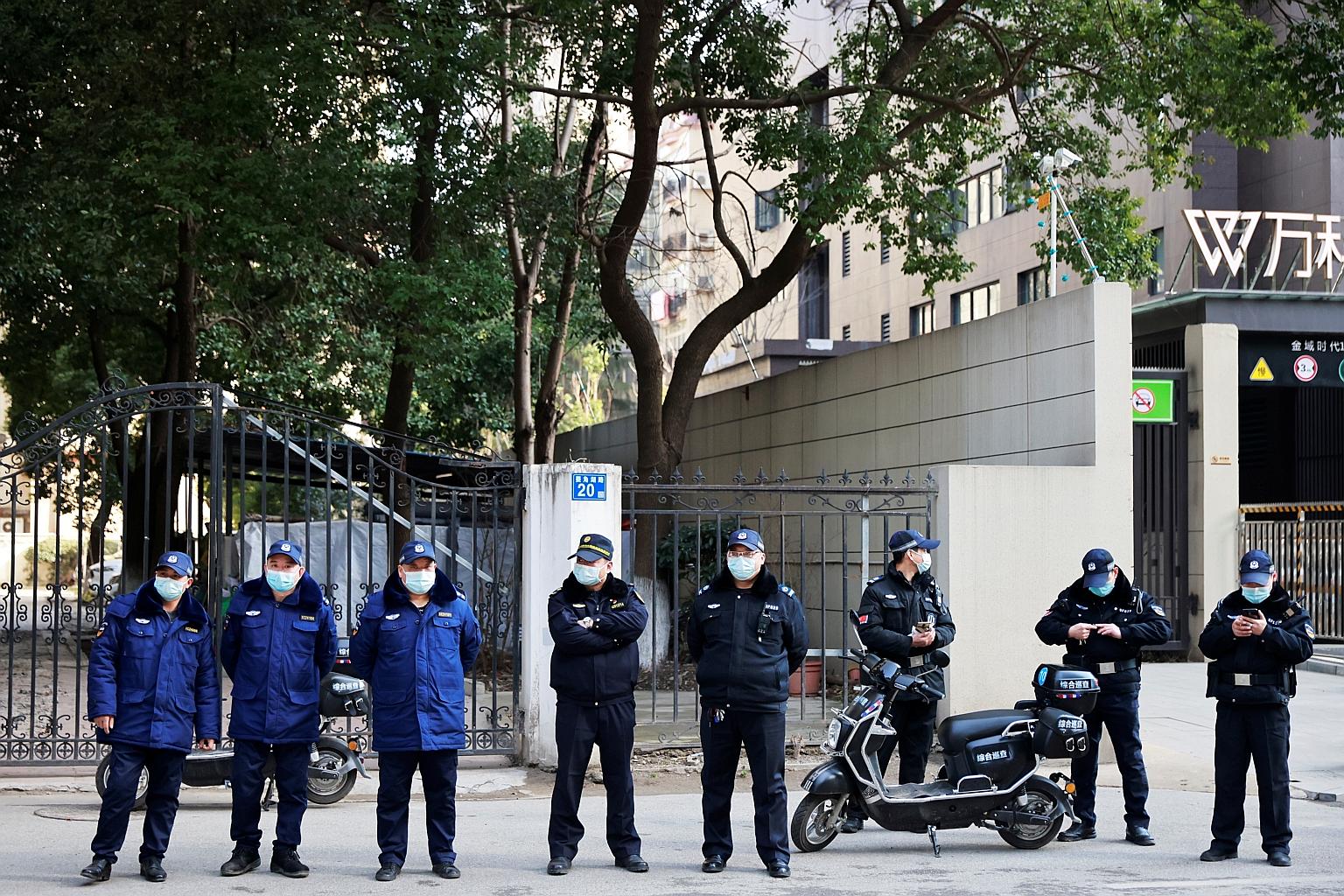WHO team visit Wuhan hospital that treated early Covid-19 cases
Sign up now: Get insights on Asia's fast-moving developments

Police officers keeping watch outside the Hubei Provincial Hospital of Integrated Chinese and Western Medicine in Wuhan yesterday during a visit by the World Health Organisation-led team of experts investigating the origins of Covid-19. The director of the hospital's department of respiratory and critical care has been cited by the state media as the first to report the novel coronavirus.
PHOTO: REUTERS
Follow topic:
WUHAN/SHANGHAI • A World Health Organisation-led team of experts investigating the origins of Covid-19 yesterday visited a hospital in the Chinese city of Wuhan that was one of the first to treat patients in the early days of the outbreak.
After meeting Chinese scientists earlier in the day, the team went to the Hubei Provincial Hospital of Integrated Chinese and Western Medicine.
Dr Zhang Jixian, director of the hospital's department of respiratory and critical care, has been cited by the state media as the first to report the novel coronavirus, after treating an elderly couple in late 2019 whose CT scans showed differences from typical pneumonia.
"Extremely important first site visit. We are in the hospital that treated some of the first known cases of Covid-19, meeting the actual clinicians and staff who did this work, having open discussion about the details of their work," Mr Peter Daszak, a member of the WHO team, wrote on Twitter.
The WHO-led team was released from two weeks of quarantine on Thursday. It plans to visit laboratories, markets and hospitals during its remaining two weeks in Wuhan, where the coronavirus was first identified in late 2019.
While an exact itinerary has not been announced, the WHO has said the team plans to visit the seafood market at the centre of the early outbreak as well as the Wuhan Institute of Virology.
A hypothesis, rejected by China, is that the outbreak was caused by a leak at the government lab.
The WHO-led probe in Wuhan has been plagued by delays, concern over access and bickering between China and the United States, which accused China of hiding the extent of the initial outbreak and criticised the terms of the visit, under which Chinese experts conducted the first phase of research.
The WHO has sought to manage expectations. "There are no guarantees of answers," its emergency chief Mike Ryan said this month.
Dr Thea Fischer, a Danish member of the team, said on Thursday: "It is important to remember that the success of this mission and origin-tracing is 100 per cent depending on access to the relevant sources. No matter how competent we are, how hard we work and how many stones we try to turn, this can be possible only with support from China."
The origin of Covid-19 has been highly politicised. The investigating team had been set to arrive in Wuhan earlier in January, and China's delay of their visit drew rare public criticism from the head of the WHO, which former US president Donald Trump accused of being "China-centric".
A Chinese Foreign Ministry spokesman Zhao Lijian yesterday said WHO and Chinese experts were working together to trace the origin of the virus, but stressed that the mission was not a probe.
"It is part of global research, not an investigation," he said.
China has pushed the idea that the virus existed abroad before it was discovered in Wuhan, with the state media citing the presence of the virus on imported frozen food packaging and scientific papers saying it had been circulating in Europe in 2019.
China's Foreign Ministry has also hinted that the sudden closure of a US army laboratory at Fort Detrick in Maryland in July 2019 was linked to the pandemic.
"At the early stage in China, it was a burden particularly for Wuhan people when everyone was calling it a Wuhan virus, which was humiliating," said Mr Yang You, a 30-year-old Wuhan resident. "If it could be traced to the source clearly, in my opinion, it could clear either China's or Wuhan's name."
China yesterday reported the lowest daily increase in its new Covid-19 cases in three weeks, according to official data, as the authorities in the regions hardest hit by the latest wave imposed robust curbs to contain the disease.
The total number of confirmed cases fell to 52 on Thursday from 54 a day earlier, said the National Health Commission. This was the lowest single-day increase since 33 cases were reported on Jan 8.
Out of the 36 locally transmitted infections, 21 were reported in Heilongjiang province while Jilin province reported 13 new ones. Beijing and the Hebei province each reported one new case. The remaining 16 cases were overseas travellers.
REUTERS

